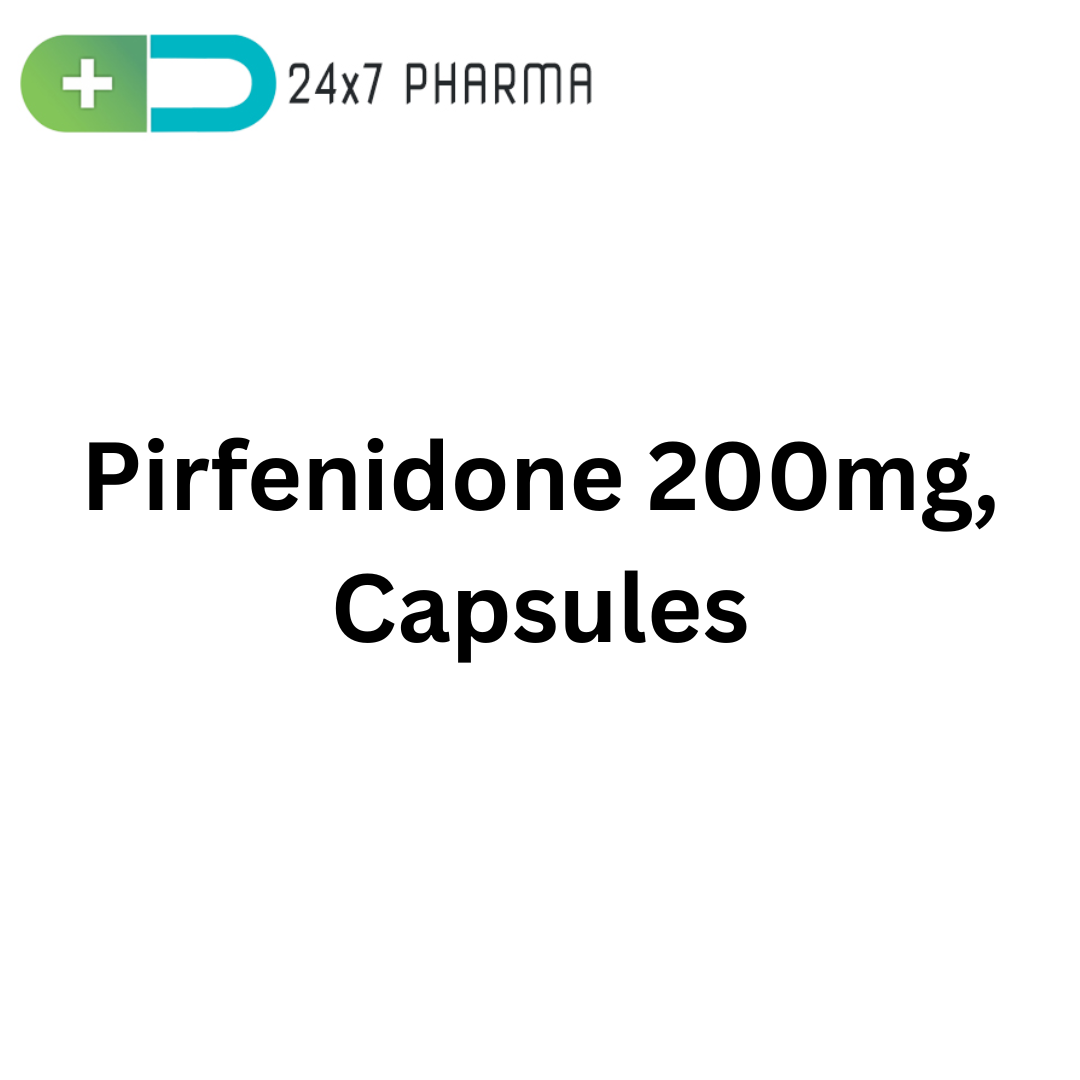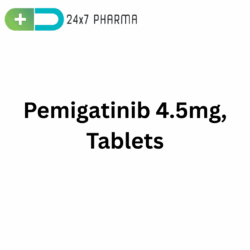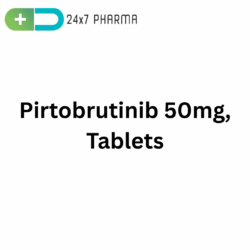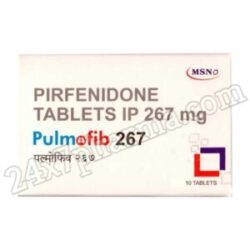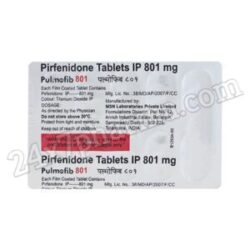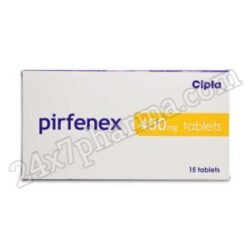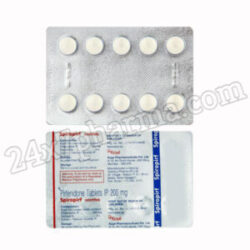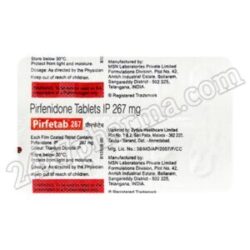LuciPirfe 200mg, Pirfenidone Capsules
LuciPirfe 200mg is a pharmaceutical formulation of Pirfenidone, an antifibrotic agent used primarily for the treatment of idiopathic pulmonary fibrosis (IPF). Manufactured by Lucius Pharmaceuticals, LuciPirfe is designed to slow the progression of IPF, a chronic, progressive, and ultimately fatal lung disease. The medication aims to improve the quality of life in patients by preserving lung function and alleviating symptoms such as shortness of breath and persistent dry cough.
What is LuciPirfe 200mg (Pirfenidone)?
Pirfenidone, a synthetic compound with antifibrotic, anti-inflammatory, and antioxidant qualities, is an ingredient in LuciPirfe 200mg. It is used to treat idiopathic pulmonary fibrosis (IPF), a rare condition where the lung tissue becomes scarred and stiff for unknown reasons. It is difficult for the lungs to function normally because of this scarring (fibrosis).
Pirfenidone works by reducing fibroblast proliferation and inhibiting the production of fibrogenic mediators such as transforming growth factor-beta (TGF-β) and tumor necrosis factor-alpha (TNF-α). For IPF, it is among the first approved disease-modifying medications.
How It Works / Mechanism of Action
Pirfenidone’s mechanism of action is multifactorial:
- Anti-fibrotic activity: It reduces the accumulation of fibroblasts and extracellular matrix, both of which are central to the fibrosis process.
- Inhibition of TGF-β: TGF-β is a key cytokine that stimulates fibrosis. Pirfenidone inhibits this pathway, thus preventing the transformation of normal cells into fibrotic tissue.
- Anti-inflammatory effect: By reducing inflammatory cytokines like TNF-α, Pirfenidone limits further lung damage.
- Antioxidant properties: It scavenges reactive oxygen species (ROS), minimizing oxidative stress—a contributor to fibrotic lung damage.
- These actions collectively slow down lung scarring, thereby maintaining better lung function in IPF patients.
How to Use / Indications
LuciPirfe 200mg is indicated for:
- The main and authorized usage is for idiopathic pulmonary fibrosis (IPF).
- Investigational uses include liver fibrosis, renal fibrosis, scleroderma-associated interstitial lung disease (SSc-ILD), and COVID-19-related pulmonary fibrosis, although these are not yet widely approved.
- Usage should always be under the supervision of a pulmonologist or respiratory specialist, as IPF is a complex and progressive disease.
How to Take / Dosage
Standard Dosing Schedule for IPF:
Pirfenidone is initiated at a low dose and gradually increased to reduce the risk of side effects.
- Days 1–7: 200 mg three times a day (600 mg/day)
- Days 8–14: 400 mg three times a day (1200 mg/day)
- Day 15 onwards: 600 mg three times a day (1800 mg/day)
- LuciPirfe 200mg is taken orally with food to minimize gastrointestinal discomfort. Dosing should be consistent, and missed doses should be avoided or taken as soon as remembered (but not doubled).
Other Dosage Forms and Adjustments
- Dose Reduction: If patients experience intolerable side effects (e.g., nausea, rash, liver abnormalities), the dose may be reduced or temporarily stopped.
- Renal Impairment: Dialysis or severe renal failure are not advised; exercise caution if you have mild renal impairment.
- Hepatic Impairment: Dose reduction may be necessary; use is contraindicated in severe liver impairment.
- Other Forms: Pirfenidone is also available in capsule and suspension forms in some markets, especially for pediatric or special-needs patients.
Side Effects
Like all medications, LuciPirfe can cause side effects. The most common include:
Common Side Effects:
- Nausea
- Diarrhea
- Rash
- Fatigue
- Anorexia
- Weight loss
- Dyspepsia
Less Common but Serious Side Effects:
- Liver enzyme elevations
- Photosensitivity reactions
- Severe skin rash or blisters
- Angioedema
- Interstitial nephritis (rare)
- Pirfenidone enhances photosensitivity, so patients should avoid the sun and wear broad-spectrum sunscreen.
Storage
- Store at room temperature (20–25°C)
- Keep away from moisture, direct sunlight, and heat
- Keep out of reach of children
- Do not use past the expiry date mentioned on the package
Benefits
- Slows disease progression: LuciPirfe has shown effectiveness in reducing the rate of lung function decline in IPF patients.
- Improves survival: Clinical trials indicate a survival benefit in patients taking Pirfenidone compared to placebo.
- Delays need for oxygen therapy or lung transplant
- Better quality of life: Slows worsening of breathlessness and fatigue.
- These benefits make Pirfenidone a vital part of long-term IPF management.
Prescription
LuciPirfe is a prescription-only medication, classified as a specialist drug:
- Can only be prescribed by a qualified pulmonologist or respiratory physician
- Requires regular monitoring of liver function tests (LFTs), and possibly lung imaging (HRCT scans)
- Not to be self-medicated due to serious side effect potential
Drug Interactions
All drugs must be disclosed to the patient’s physician. Notable interactions include:
- Ciprofloxacin (and other CYP1A2 inhibitors): May increase Pirfenidone levels; dosage adjustments may be required.
- Smoking: Smoking reduces drug concentration due to enzyme induction.
- Fluvoxamine: Should be avoide as it significantly increases Pirfenidone levels.
- Hepatotoxic medications, such as amiodarone, increase the risk of liver damage.
- NSAIDs should be used carefully, particularly in individuals who have renal impairment.
- When taking Pirfenidone, always get your doctor’s approval before beginning or stopping any medicine.
FAQs
Is LuciPirfe a cure for IPF?
No, LuciPirfe does not cure IPF. It helps slow the progression of the disease and manage symptoms.
How long should I take LuciPirfe?
IPF is a chronic condition. LuciPirfe is typically taken indefinitely, as long as it is effective and tolerated.
Can LuciPirfe be take on an empty stomach?
No, always take with food to avoid side effects.
Conclusion
A key component of the treatment of idiopathic pulmonary fibrosis, LuciPirfe 200mg (Pirfenidone) gives patients the opportunity to control an illness that was previously incurable. With its antifibrotic and anti-inflammatory properties, it slows disease progression, improves survival, and maintains lung function.
By adhering to prescribed usage and regular follow-ups, patients can benefit significantly from LuciPirfe, enjoying better symptom control and an improved quality of life.

